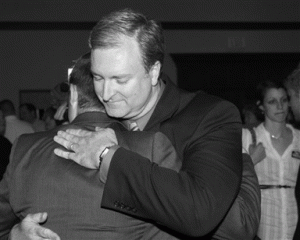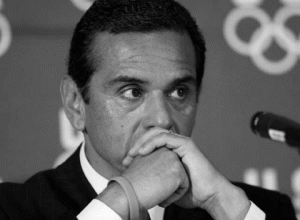Is This Any Way to Run a City’s Schools?
Leaked CTU Proposals Won’t Do Anything to Improve Schools’ Poor Performance

Refusal to Respond to Right to Work Survey ‘Raised Concerns’
Just a few months ago, Kentucky Secretary of State Trey Grayson was widely considered the favorite to win the GOP nomination this year for the U.S. Senate seat now held by pro-Right to Work Republican Jim Bunning, who is retiring after two terms.
A number of pundits contended that the strong support of Mitch McConnell, Kentucky’s senior U.S. senator and the head of the GOP minority in the upper chamber of Congress, would practically guarantee Mr. Grayson’s nomination.
However, the Grayson campaign made serious misjudgments during the final weeks before Kentucky’s May 18 primaries.
Most important to pro-Right to Work Kentuckians, Mr. Grayson refused to pledge to oppose several of the top power grabs now being advanced on Capitol Hill by Organized Labor, the #1 pro-Big Government special-interest group in America today.
More broadly, many voters who were deeply concerned about the rapid growth in federal spending under the George W. Bush Administration as well as under the current one became convinced Mr. Grayson lacked the intestinal fortitude to fight to reduce spending from its current stratospheric level.
‘Any Genuine Opponent of Big Government Would Eagerly Oppose’ Police/Fire Scheme
“One of the top items on Congress’s agenda this year is an intrusive federal mandate that would impair the ability of states and localities to keep their expenditures of taxpayer dollars under control,” noted National Right to Work Committee President Mark Mix.
“Any genuine opponent of Big Government would eagerly oppose this scheme, union bosses’ Police/Fire Monopoly-Bargaining Bill [S.3194/H.R.413].
“Yet Trey Grayson refused to say a word against this destructive legislation, despite the fact that thousands and thousands of Committee members and supporters in Kentucky asked him to do so, time and time again.
“And his silence was especially disturbing because a handful of Senate Republicans are already publicly supporting the Police/Fire Monopoly-Bargaining Bill. Even one more could potentially make the difference.
“Fortunately, in this election Kentucky primary voters had several other candidates to choose from who pledged to oppose public-safety union monopoly bargaining and support Right to Work 100%. And one of them, opthamologist Rand Paul, was a top-tier candidate.”
In the end, Mr. Paul, who had started out the primary campaign as the distinct underdog, soundly defeated Mr. Grayson by a whopping 59% to 35% margin.
Big Government Is Big Labor’s ‘Bread and Butter’
By handing Mr. Paul a decisive victory, Kentucky primary voters sent a clear message to Capitol Hill Republicans that they want candidates who really will fight against the expansion of forced unionism and the increased cost of Big Government it brings, and not just mouth “feel good” rhetoric about this serious and rapidly growing problem.
“Trey Grayson’s refusal to respond to his Right to Work candidate survey this year, especially to the questions concerning public-sector forced unionism, clearly raised concerns that he was going to be just another ‘Big Government Republican,'” observed Mr. Mix.
“Kentucky voters were right to be concerned.
“Over the course of the past few decades, public servants, especially state and local public employees, have become Big Labor’s bread and butter.
“By 2009, union officials wielded monopoly-bargaining power over 7.5 million state and local employees, nearly 43% of all such employees nationwide, compared to just 8% of private-sector workers.
“Moreover, for many years now, Big Labor featherbedding and counterproductive work rules have sharply increased real taxpayer costs for compensation of state and local government employees.
“In fact, from 1998 to 2008 alone, taxpayers’ aggregate real costs for compensation of state and local government employees soared at a rate nearly 50% faster than the total real growth of private-sector employee compensation!”
Mr. Mix continued: “S.3194 and H.R.413, sponsored, respectively, by Big Labor Democratic Senate Majority Leader Harry Reid and union-label Michigan Democratic Congressman Dale Kildee, would sock it to taxpayers again.
“This legislation would impose a new federal mandate ensuring that government union bosses get monopoly-bargaining privileges over additional hundreds of thousands of state and local public-safety employees.
“And the reason it is now on the verge of passage is that a handful of Senate Republicans are siding with Mr. Reid. In the House as well, a minority of Republicans, along with practically all Democrats, are in favor of the monopoly-bargaining bill.
“But scientific polls and multiple election results show that citizens across America overwhelmingly oppose public-sector union monopoly bargaining.
“The stinging defeat Trey Grayson suffered in Kentucky, after the Committee had notified hundreds of thousands of citizens through the mail and the Internet about his pointed refusal to oppose Reid/Kildee, is only the latest example.
“I’m cautiously optimistic the Kentucky election results will serve as a wake-up call for the D.C. establishment regarding just how deeply unpopular the Reid/Kildee legislation is.”
System That Congress Wants To Expand Is Currently Bankrupting Los Angeles

Reid-Kildee would federally impose union monopoly bargaining by denying localities the option to refuse to grant a single public-safety union the power to speak for all front-line employees, including those who don’t want to join.
Monopoly bargaining, euphemistically labeled as “exclusive representation,” would be foisted on state and local police, firefighters, and other public-safety employees nationwide.
And in most states that already authorize public-safety union monopoly bargaining, S.3194/H.R.413 would widen its scope.
“In every political jurisdiction, public spending tends to grow faster than taxpayers’ incomes, rendering government costs more and more burdensome over time. But decades of experience shows public-sector monopoly bargaining greatly exacerbates this problem,” Mr. Mix commented.
“For example, this summer the skyrocketing costs of public-safety monopoly bargaining are frighteningly close to driving the once-great city of Los Angeles into insolvency. L.A. Mayor Antonio Villaraigosa [D], himself a former union organizer, has acknowledged the real possibility.
“Congress must not federalize the very system that is now bankrupting Los Angeles. It’s just that simple.”

Leaked CTU Proposals Won’t Do Anything to Improve Schools’ Poor Performance

Wherever Big Labor wields the power to collect forced union dues, union bosses funnel a large share of the confiscated money into efforts to elect and reelect business-bashing politicians. Employment growth tends to lag as a consequence.

Members Insist They Keep Pro-Right to Work Campaign Promises